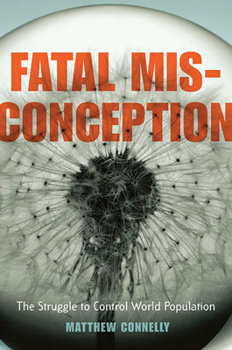Fatal Misconception: The Struggle to Control World Population
Select Format
Select Condition 
Book Overview
Fatal Misconception is the disturbing story of our quest to remake humanity by policing national borders and breeding better people. As the population of the world doubled once, and then again, well-meaning people concluded that only population control could preserve the "quality of life." This movement eventually spanned the globe and carried out a series of astonishing experiments, from banning Asian immigration to paying poor people to...
Format:Paperback
Language:English
ISBN:0674034600
ISBN13:9780674034600
Release Date:March 2010
Publisher:Belknap Press
Length:544 Pages
Weight:1.65 lbs.
Dimensions:1.4" x 5.8" x 8.8"
Customer Reviews
5 ratings
Powerful pro-life weapon
Published by Thriftbooks.com User , 14 years ago
Great book. Valuable historical insight, and fair warning to those societies being tempted, or coerced into commodifying human life.
Lions and tigers and too many babies, oh my!
Published by Thriftbooks.com User , 15 years ago
This is a beautifully written book about an incendiary topic. Starting with Malthus many argued that population would overwhelm our resources. Life expectancy kept growing, swelling the levels of humans alive. A vast population control movement swung into motion, bent on stamping out population growth everywhere, but especially in poor countries. Many of the early members of the movement seemed inspired by racism. Margaret Sanger and the eugenics theories of the 1930's wanted to see more breeding by white intellectuals, and fewer babies born by the poor. Some others stressed concern for food resources. Even in the 1960's Ravenholt, head of USAID, said that "abortion was especially appropriate for poor people, since they lacked the foresight to use birth control" (p 244). It is fascinating reading about the unending divisions sent out by the United Nations to reduce population. There were incentives for those in poor countries who agreed to sterilization. Trained women marched through villages, passing out condoms, pills, and lots of advice. In many areas some degree of force or deception was used to reduce population. Notoriously, China introduced a one child policy and many women were given abortions under force. Those against the population movement fought a rearguard movement with little success. Connelly doesn't care for these people much, but Pope John Paul wrote "a new encyclical, Evangelium Vitae, (the Gospel of Life)...and pounded home his arguments in virtually every public appearance" (p 386). It is too bad that Connelly didn't provide more information on the results of the population movement. He does point out that "the number of children per women fell between 1950 and 2000 in cuontries with strong population control programs. But it also dropped dramatically during the same period in countries that made little effort to stop population grown or even encouraged it (p 374). Connelly doesn't point out that even the UN agrees that world population will peak around 2050 due to rising life expectancy. From that time, population will start to drop like a stone. Anyone interested in the topic will want to pick up "Disappearing Daughters" which documents the 100 million missing women in China and India. Abortion, infanticide, and poison being among the many methods used to dispose of unwanted females, leaving these countries awash in men. Another book on this topic is "Bare Branches".
Thorough and Fair
Published by Thriftbooks.com User , 16 years ago
Though science is a progressive activity, social policies defended as "scientific," when examined in hindsight, often reveal themselves to be based on little more than ephemeral cultural beliefs. Historical analyses of social policies 50 years on almost always uncover strong, sometimes fatal, nationalist, class, race, or gender-biases. Yet, our faith in progress drives us to believe that the mistakes of the past were due simply to inadequate data or poor modeling, not a general and unavoidable gulf between what is knowable scientifically and what is necessary to function communally and politically. Nicolas D. Kristof, in his review of Matthew Connelly's "Fatal Misconception," (NYT: March 23, 2008) expresses this faith (and error) when he asserts, "The family planning movement has corrected itself, and today it saves the lives of women in poor countries and is central to efforts to reduce poverty worldwide." Connelly does not dispute that the ability to control fertility is a welcome and empowering development. However, he makes a strong case that it has been "the emancipation of women, not population control, that has remade humanity." Connelly ably defends his central thesis - "the great tragedy of population control, the fatal misconception, was to think one could know people's interests better than they knew it themselves" - and alerts us to the continued universality and threat of this misconception. International population control efforts of the 1960s and 70s are often characterized today, particularly by feminist scholars, as extensions of imperialist policies. But Connelly's warning that "the spirit of empire lives on when people are unaccountable to those they claim to serve" is something I think we would all do well to contemplate. Connelly's book is thoroughly researched and extremely well written. Highly recommended.
A must read for people involved in pubic health
Published by Thriftbooks.com User , 16 years ago
I was a public health activist in the 60s and supported population control as appropriate public health policy. Mr. Connelly's extremely well documented book about population contral has contributed to my rethinking population control and public health policy in general. The well written book raises important questions about health policy today. The book is must reading for health policy makers and students of public health. Should be a required text in Schools of Public Health
Tour de Force
Published by Thriftbooks.com User , 16 years ago
In this remarkable book, Connelly writes about the international history of population control movements. Strengths: Exceptionally well-written (does not read like a typical university press history book), superbly researched (solid and extensive archival research), and poignantly (and passionately) argued. Weaknesses: None. Recommended for: the general public, politicians, family planning officials, the Board of Immigration Appeals




